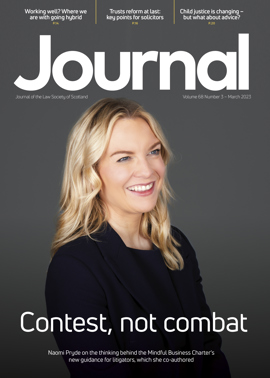Corporate: Privileged or confidential – who can access
Recent decisions have focused on legal professional privilege (“LPP”) and confidentiality, and the circumstances in which these can be overcome.
In Scottish Legal Complaints Commission v Murray [2022] CSIH 46, the Inner House held that the SLCC (and indeed any regulator) is not allowed to recover information covered by LPP within a file, except within strictly defined circumstances. In a further opinion in the same case ([2022] CSIH 54), the court confirmed that confidential information is treated differently to LPP, and that where a statutory notice is issued by a regulator, the solicitor is obliged to provide information which is confidential (and not covered by LPP). The court agreed with the English case Three Rivers District Council v Bank of England [2005] 1 AC 610, highlighting a dictum that “confidentiality in the general sense is a prerequisite for the claim of privilege, but of itself it is insufficient to give rise to it”.
The case concerned files in divorce proceedings, sought because a third party complained against her estranged husband’s solicitors. The SLCC applied under s 17(1) of the Legal Profession and Legal Aid (Scotland) Act 2007 for delivery of the file; the solicitors refused, advising that their client was maintaining confidentiality. They were additionally advised by the Law Society of Scotland not to release the material as it was covered by LPP. The Society, along with the Faculty of Advocates, intervened in the case given the importance of the issues raised.
Parties were agreed generally as to the situations in which privilege could be overcome, but disagreed as to what constituted being overridden by statute (in this case, s 17(1)). One question was whether it could be necessarily implied from the 2007 Act that it would override privilege. After examining the 2007 Act the court concluded that LPP was in fact preserved by the Act. A client who wished to proceed with a complaint under the Act would need to waive privilege in their information, which was their prerogative, therefore it did not make sense that a third party would be able to circumvent that right, that choice and remove the LPP “by inference”.
Rights of trustee
Two recent English insolvency cases have also provided further insights on the treatment of LPP, particularly where it is mixed up with the rights of others. In Glasgow v Ames [2022] EWHC 2834 (Ch), a foreign insolvency representative had been trying to access documents relating to Harlequin Property (SVG) Ltd, acknowledged to be part of the “Harlequin Group”, run by the sole director David Ames across different companies incorporated in different jurisdictions (and not through the topco/subsidiary structure). The servers where the documents were stored were owned by a different Harlequin company, still under the control of Ames (who by the time of this case, had been imprisoned for 12 years for fraud), but a copy of the servers had been taken for the purposes of Ames’ trial.
Ames argued that the majority of the documents were subject to LPP resting in others than the company, and the remainder related to his family’s personal affairs. However the court ordered disclosure: although some of the documents might not be related to the company’s business, the court and others involved had not been able to identify what could be excluded.
In examining the “mess of contractual affairs”, which involved over 40 companies, the court agreed with the insolvency trustee’s multi-step approach. This involved, for example, applying negative keyword searches to some 64 million items stored on the server data, to exclude results which could at first appearances be subject to others’ privilege (including a number of legal advisers); and applying a positive search term to the balance (provided privileged documents would be disregarded).
LPP held jointly
Another recent insolvency case, Re Kwok [2023] EWHC 74 (Ch) concerned privilege held jointly by the bankrupt, Kwok, and two other parties, on a foreign insolvency trustee’s application to obtain documents under the Insolvency Act 1986. The bankrupt was a party (alongside two others) to a potentially lucrative claim against UBS for some $500 million; however the trustee had seen no documents pertaining to the case. One of those other parties sought to exercise LPP against the trustee, citing concerns of conflict of interest. The trustee argued that Kwok’s interest in the UBS claim should vest with him due to the application of the UNCITRAL Model Law, and the court agreed that it had a discretionary power to make orders under the 1986 Act.
The High Court determined that although the joint engagement between the three parties in relation to UBS meant that each party had a joint interest in the privileged file, access should be granted to the file. LPP could not be asserted against those with whom they shared that privilege, or therefore to resist an application under the Insolvency Act by one party’s trustee in bankruptcy to access that material. A trustee in bankruptcy would have power to see documents over which the bankrupt exercised privilege (1986 Act, s 311), but the trustee would not obtain said privilege, nor have power to waive it without permission of the court (and in granting access to the trustee, the court noted favourably that the trustee proposed to deal with the documents in a manner consistent with the other parties’ privilege).
These cases are useful in assessing the extent to which LPP applies, and in planning how information is dealt with (especially when considering entering into a joint retainer or using a shared server). Confidential information is not always privileged, and even where LPP exists, insolvency can throw up some curveballs in terms of who is allowed access to see what.
Perspectives
Features
Briefings
- Civil court: No rule against redaction
- Corporate: Privileged or confidential – who can access
- Intellectual property: Big tech, AI and enforcement
- Succession: Non face-to-face will instructions; form C1
- Agriculture: “Route map” for agricultural reform
- Parking: About this ticket…
- In-house: Caring for the carers







